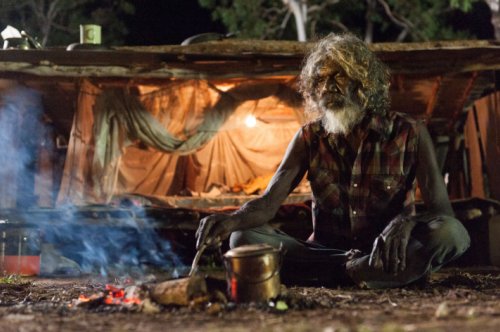Reviews - Charlie's Country
Charlie's Country
Reviewed By John Porter

Charlie's Country
Life in the Aboriginal community goes by day-to-day for Charlie (David Gulpilil). He claims money, hands it out to friends, bums a smoke or three, and shouts abuse at the local lawmen in indigenous dialect. Charlie sees the problems, but struggles to make sense of it all: The alcoholism, police control, racism, and the theft of land and culture are all contributing to the loss he feels. Rolf De Heer's "Charlie's Country" is at once a collection of these problems into a tightly focused narrative, and also an attempt to distil them into a single expression of native solidarity.
The movie takes the form of a journey through modern Aboriginal Australia, and back into it's heritage with equal levels of plight and hope. Exasperated at having his shotgun confiscated on a buffalo hunt, Charlie returns to the Arnhem Land wilderness to fish and forage, becoming animated and exclaiming that, "the ancestors used to eat these". He laughs at the greenery, paints with ash and earth pigments, and sleeps under ancient petroglyphs. The rural location is presented differently from the routine of settlement, being organised in a map of visual landmarks such as a distant conical mountain and nestling plain, and Charlie's words, although out loud, never appear as a forced soliloquy for audience benefit, merely adding a sense of home comfort that we did not see in the community. Charlie's country is a place in the bush, but it is also a way of life, and a specific connection to the world.
With the onset of the rains, Charlie falls ill and is sent to hospital in Darwin which results in drinking, taking a shovel to a police car, and being incarcerated. We watch him against a black background being shaved with clippers, literally being stripped of everything. With an abrupt edit to remove the barber, Gupilil is suddenly alone looking directly into camera, and we are reminded of his previous shouts from the police-van cage: “You took our culture and replaced it with your own bastard culture”.
The movie is presented from an entirely Aboriginal point of view, the only impressions of the 'whitefella' being institutions: The police and courts, the hospital, prison, and of course money. We follow Charlie closely, often with the background heavily blurred, diverting all our attention to his face and leathered skin. The movie sometimes verges on a study of Gulpilil, hanging onto shots of his defined body walking, his thin shoulder blades, or close ups resting on the set of his eyes or wrinkled hands. The script too is composed in such a way as to give Charlie's voice a wise and unarguable truth. The police didn't confiscate his gun, they, "stole it", and when his spear too is taken as an offensive weapon, Charlie protests that it is a, "hunting spear, not a fighting spear". This subtle shift of language provides a way for de Heer to present an Aboriginal perspective of colonization. Later a white doctor reads Charlie's papers only to remark that he, "can't pronounce foreign names", before noting that, "they found you in the bush?" "I was born in the bush", is Charlie's reply.
Prison is everything Aboriginal life is not: Enclosure, repetition, pointless chores, and artificial light. It is presented, like the system of money at the grog cashpoint or in the community handouts, as a soulless, habitual system defined by order and regimentation. Every night Charlie stares at the fence before waiting on his bed for the clang of lights out. In one abstractly beautiful shot, a long pan across coils of razorwire gives the effect of spiralling its horizontal line into one of extended, slow tilting. Sound design exaggerates the oppressive atmosphere yet further, both the hospital and prison haunted by echoes from their hard walls.
The movie is ultimately a ray of hope however, with Charlie being asked to teach traditional dance to the community kids. His reaction, only made possible by his journey amidst the wrongs committed against his people, proves that where there is a will to live the old ways, their survival is not only possible but also essential. The final firelit shots of painted bodies and native rhythms stand tall as something that is not so easily lost.
The movie takes the form of a journey through modern Aboriginal Australia, and back into it's heritage with equal levels of plight and hope. Exasperated at having his shotgun confiscated on a buffalo hunt, Charlie returns to the Arnhem Land wilderness to fish and forage, becoming animated and exclaiming that, "the ancestors used to eat these". He laughs at the greenery, paints with ash and earth pigments, and sleeps under ancient petroglyphs. The rural location is presented differently from the routine of settlement, being organised in a map of visual landmarks such as a distant conical mountain and nestling plain, and Charlie's words, although out loud, never appear as a forced soliloquy for audience benefit, merely adding a sense of home comfort that we did not see in the community. Charlie's country is a place in the bush, but it is also a way of life, and a specific connection to the world.
With the onset of the rains, Charlie falls ill and is sent to hospital in Darwin which results in drinking, taking a shovel to a police car, and being incarcerated. We watch him against a black background being shaved with clippers, literally being stripped of everything. With an abrupt edit to remove the barber, Gupilil is suddenly alone looking directly into camera, and we are reminded of his previous shouts from the police-van cage: “You took our culture and replaced it with your own bastard culture”.
The movie is presented from an entirely Aboriginal point of view, the only impressions of the 'whitefella' being institutions: The police and courts, the hospital, prison, and of course money. We follow Charlie closely, often with the background heavily blurred, diverting all our attention to his face and leathered skin. The movie sometimes verges on a study of Gulpilil, hanging onto shots of his defined body walking, his thin shoulder blades, or close ups resting on the set of his eyes or wrinkled hands. The script too is composed in such a way as to give Charlie's voice a wise and unarguable truth. The police didn't confiscate his gun, they, "stole it", and when his spear too is taken as an offensive weapon, Charlie protests that it is a, "hunting spear, not a fighting spear". This subtle shift of language provides a way for de Heer to present an Aboriginal perspective of colonization. Later a white doctor reads Charlie's papers only to remark that he, "can't pronounce foreign names", before noting that, "they found you in the bush?" "I was born in the bush", is Charlie's reply.
Prison is everything Aboriginal life is not: Enclosure, repetition, pointless chores, and artificial light. It is presented, like the system of money at the grog cashpoint or in the community handouts, as a soulless, habitual system defined by order and regimentation. Every night Charlie stares at the fence before waiting on his bed for the clang of lights out. In one abstractly beautiful shot, a long pan across coils of razorwire gives the effect of spiralling its horizontal line into one of extended, slow tilting. Sound design exaggerates the oppressive atmosphere yet further, both the hospital and prison haunted by echoes from their hard walls.
The movie is ultimately a ray of hope however, with Charlie being asked to teach traditional dance to the community kids. His reaction, only made possible by his journey amidst the wrongs committed against his people, proves that where there is a will to live the old ways, their survival is not only possible but also essential. The final firelit shots of painted bodies and native rhythms stand tall as something that is not so easily lost.
Find A Film
Search over 1500 films in the Keswick Film Club archive.
Friends
KFC is friends with Caldbeck Area Film Society and Brampton Film Club and members share benefits across all organisations
Awards
Keswick Film Club won the Best New Film Society at the British Federation Of Film Societies awards in 2000.
Since then, the club has won Film Society Of The Year and awards for Best Programme four times and Best Website twice.
We have also received numerous Distinctions and Commendations in categories including marketing, programming and website.
 Talking Pictures
The KFC Newsletter
Talking Pictures
The KFC Newsletter
Links Explore the internet with Keswick Film Club


